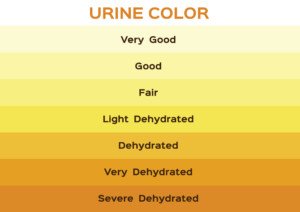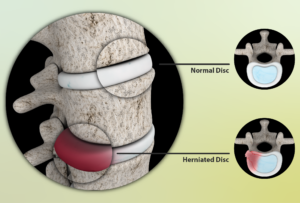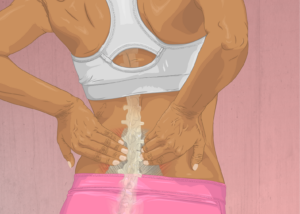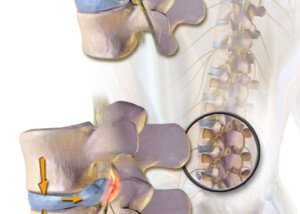
A bulging disc in the lower back can cause low back pain.
Many people drink much less water than they actually believe.
For optimal health and well-being, getting enough water is crucial.
When a disc bulges, this means that the spongy, shock-absorbing tissue that’s between the vertebral bones juts or oozes out of its place.
This can irritate nearby nerves, leading to pain or aching in the low back. The discomfort may radiate down a leg or include tingling.
Not Enough Water
To avoid dehydration, you should not wait until you’re very thirsty.
In fact, dark yellow, and especially orange, urine is an indicator that you’re not adequately hydrated — even if you do not feel thirsty.

Shutterstock/gritsalak karalak
Is there a connection between dehydration and a bulging disc?
“Yes, dehydration can cause a bulging disc,” says Dr. Michael Perry, MD, member of the North American Spine Society and American College of Sports Medicine.
It’s hard to believe, but true: Not drinking enough water can lead to a bulging disc.
“As most people know, the body is made up of 67 percent water, and some of that water is stored in the spine,” explains Dr. Perry.
He continues: “Our spinal discs are composed of two parts: annulus fibrosus —tough circular exterior composed of collagen fibers, and nucleus pulposus — inter core with a loose network of fibers suspended in a mucoprotein gel.”
The discs are shock absorbers. Dr. Perry explains that “about 75 percent of the pressure applied to the disc is on the nucleus pulposus.
“When the discs become dehydrated, the pressure is no longer on the nucleus pulposus but spreads throughout the entire disc.
“When pressure spreads to the annulus fibrosus, you can get cracks or bulges.

Source: myupchar. com
“This can also create pressure on the nerves and lead to other issues such as leg pain caused by sciatica.”
Dr. Perry adds, “Another interesting thing to note is that when we’re up standing or walking all day, we put enough pressure on our discs that can cause some people to even lose one-forth inch of height between when they wake up and go to bed.
“This is due to pressure and compression causing dehydration of the discs.
“When you lie down at night, the discs have time to extend and intake water. The discs are more likely to expand and the cushion effect becomes more apparent during rest and sleep.”
To make drinking eight to 10, eight-ounce glasses of water every day more feasible, make homemade lemonade, drink tea or add some water to your morning orange juice.
Soda never counts as water. Snack on cucumbers, watermelon and tomatoes, which have a high water content. Drink water with your meals instead of juice, soda or milk.
 Dr. Perry is chief medical director and co-founder of USA Spine Care & Orthopedics, and is frequently sought out for his minimally invasive spine surgery expertise.
Dr. Perry is chief medical director and co-founder of USA Spine Care & Orthopedics, and is frequently sought out for his minimally invasive spine surgery expertise.
 Lorra Garrick has been covering medical, fitness and cybersecurity topics for many years, having written thousands of articles for print magazines and websites, including as a ghostwriter. She’s also a former ACE-certified personal trainer.
Lorra Garrick has been covering medical, fitness and cybersecurity topics for many years, having written thousands of articles for print magazines and websites, including as a ghostwriter. She’s also a former ACE-certified personal trainer.
.









































